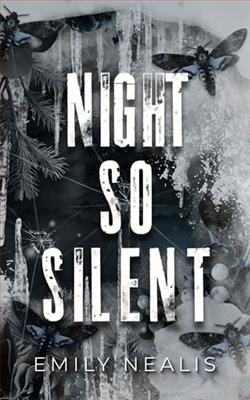Page 77 of Our Last Resort
It clatters lightly against the floor.
I crouch to get a better look at it. Not that I need a better look. I know exactly what it is. I’d recognize it even with one eye closed, even with a gun to my head.
There are things you don’t forget.
Like: Gabriel bumping into Sabrina Brenner on our first day here. Like: the undercurrent of flirtation that passed between them as they traded apologies. Like: the butterfly hair clip she caressed as she spoke to Gabriel. The tip of her fingers tracing the shape of a wing the same way they might have traced Gabriel’s jawline, or the squiggly path of a blood vessel on the inside of his arm.
The butterfly hair clip she wore three days before her death. The same butterfly hair clip that somehow ended up in Gabriel’s backpack.
27The Only Town We Knew, Hudson Valley, And Outside-Outside
Fifteen Years Ago
Émile wanted a fire.
The man loved fires. As soon as the temperatures started warming up in the spring, he had us build massive campfires. We’d sit around them while he told stories—pontificated—for hours, until the little kids fell asleep on mothers’ laps and the older ones couldn’t hold back their yawns. He talked; we listened; he loved it.
That year, he craved it even earlier than usual. Never mind that it was December. Who cared about the seasons? If Émile was ready for spring, then it was spring.
A couple of nights after my conversation with Gabriel, Émile had us all gather around the firepit. He was in a good mood, smiling as he sat close to the fire, wrapped in a fat down coat. There must have been 150 of us, all told. Gabriel and I scored seats at the front, but the crowd was five deep. I didn’t want to think about how cold those at the back must have been.
Those days, it was tough to think about the others, generally. Girls older than I was, who had failed to warn me. And the younger ones, of course, whom I was failing in the exact same way. All those girls I couldn’t save.
Émile rubbed his hands close to the flames as he launched into a story.
“Once upon a time,” he said, “there was a sick baby girl. Her father was a peasant. He sent his sons to collect water from a spring to baptize their sister.”
We assumed he’d made up the story, but I recognized it years later in a thick book of Grimms’ fairy tales at the public library. It was called “The Seven Ravens.” The brothers lose the jug; their father, angry, curses his own sons and turns them into ravens. Years later, the sister, grown and healthy, goes in search of her brothers. She asks and asks and asks—asks the sun and the moon and the morning star until she finds them. Ultimately, she restores them to human form.
“It’s the girl who saves the boys,” Émile said. “Not the other way around.”
He looked at us when he said it, girls aged fifteen to eighteen, huddled to one side.
“She knows they need her help,” Émile continued, “and she does everything she can to rescue them.”
He was animated, arms in motion, eyes reflecting the glow of the fire.
There was power there. There was allure. Something that transcended time and place, that made you think of the grand tradition of storytelling. He was, in that moment, a spokesperson for generations past. Someone who could see the workings of the world more clearly than any of us.
It was almost enough to make me forget. Well, notforget,exactly—there was no forgetting—but almost enough to make me access the place Émile had occupied in my mind, before.
And then.
It was like the flames knew.
One moment, Émile was gesticulating, and the next, he was on fire. His left arm, specifically, was burning.
The flames spread up his down coat, toward his neck. Soon they’d be licking his face.
Émile screamed. Around him, three mothers sprang into action. Émile was big on fire safety. It was part of his wholeself-sufficiency thing: He needed us to be able to rescue ourselves, without outside help.
We knew about stop, drop, and roll. As far as we were concerned, Émile had invented stop, drop, and roll. But in his panic, he needed the mothers to help him down to the ground. Their hands guided him through the stop and drop part. Roll, he had to figure out by himself. The mothers could no longer touch him. The flames were everywhere.
Clumsily, Émile rolled.
After a few excruciating seconds, he got back up.
“I’m fine,” he said, patting himself as if to make sure.















